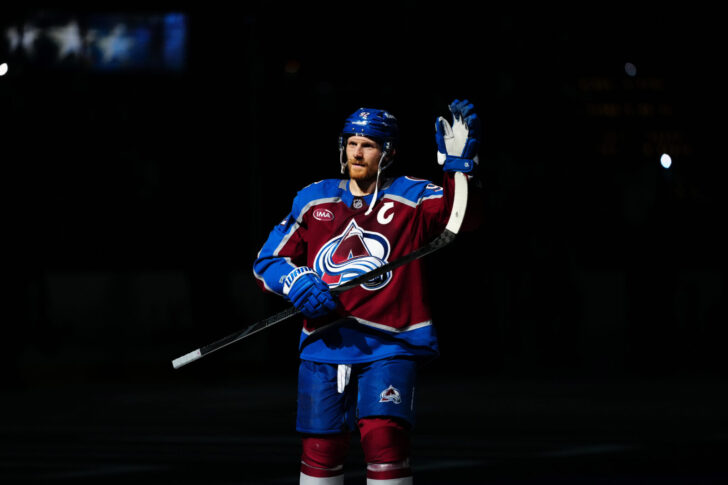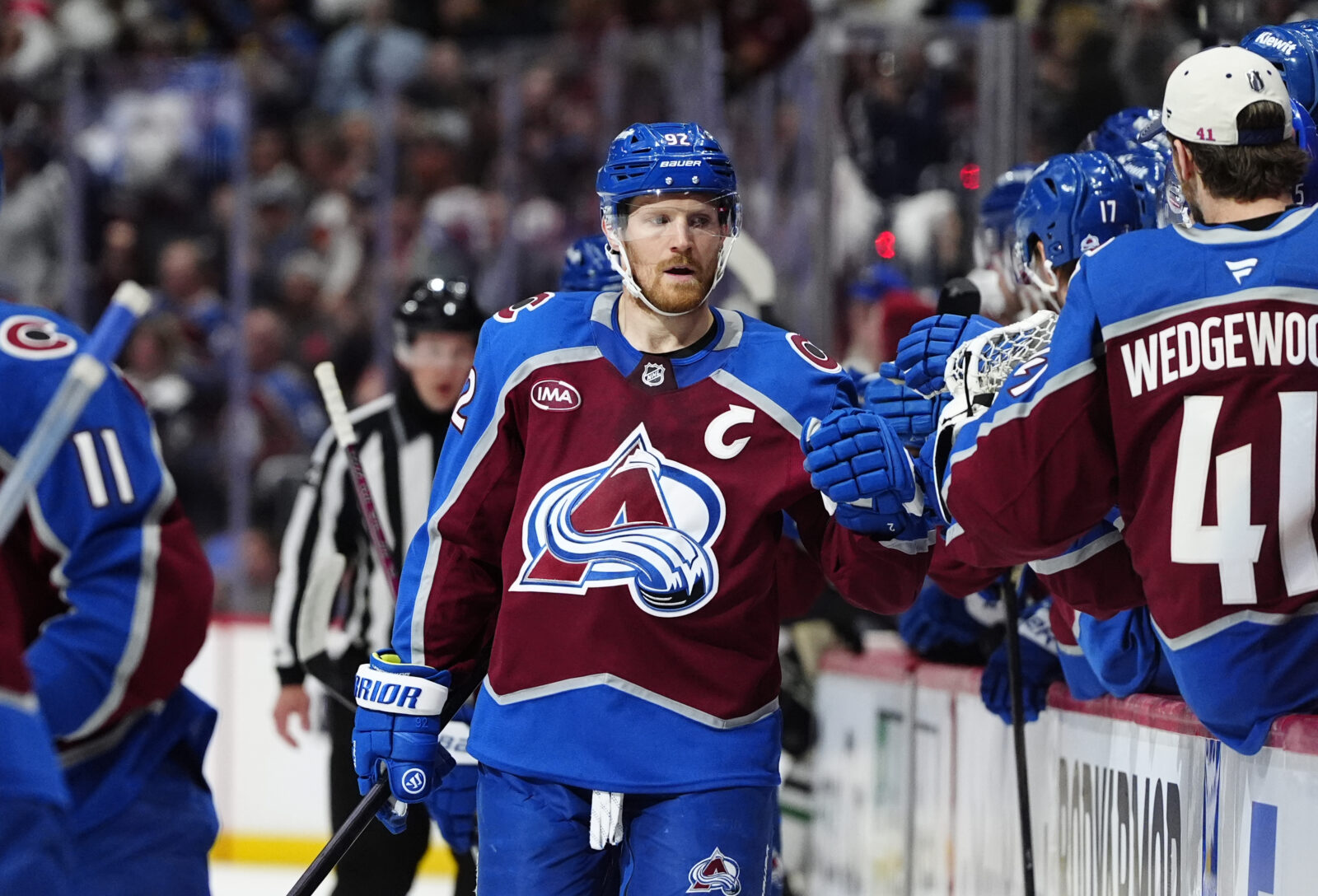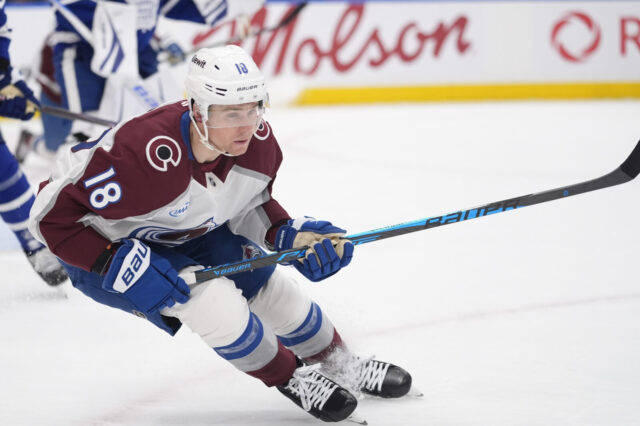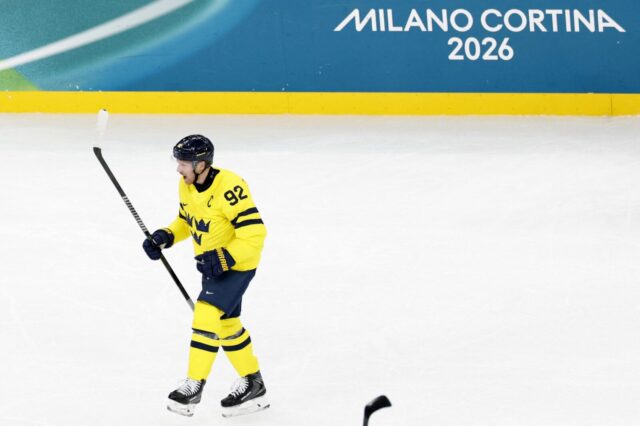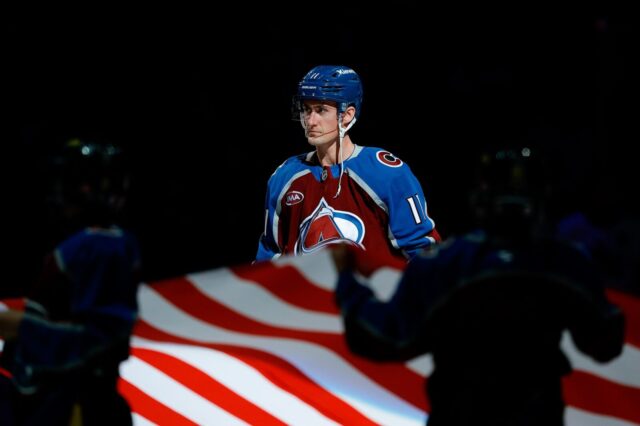The following appears in The Winter Issue of Mile High Sports Magazine. Get your copy here.
“Ball Arena has never been louder.”
It’s a sentiment that’s been said more than once, always about the same thing – Gabe Landeskog’s first game back with the Colorado Avalanche. The story has been well-told: after suffering a knee injury in the 2022 Stanley Cup Playoffs, Landeskog was unexpectedly sidelined for three seasons. Battling back — a tedious task filled with plenty of ups and downs — the Avalanche captain returned for Game 3 of the Western Conference First Round against the Dallas Stars.
And when he did, Stan Kroenke nearly had to replace the roof. Landeskog’s comeback signified much more than the return of an excellent hockey player, or even the team’s captain. As he’ll tell you more eloquently in the words that follow, the results are great, but the journey is everything.
MHS: You famously said, “That was as close as I got to losing it” when you saw your kids in the arena with the sign that said, “So proud of you daddy” welcoming you back to the ice for the first time since 2022. Throughout this entire process – from the comeback to the right here and now – what role did your kids play in it?
Landeskog: Without them even knowing it — they’re just blissfully unaware as to how much they’ve inspired me over the last three years – unaware to themselves, but they’ve just held me accountable. I would hate to one day say that I had an opportunity to do something and I wasn’t able to pull through and do it. Whatever the outcome was going to be, I just kept looking at them saying, “Hey, I’m going to keep working for it; see where it takes me.” They had a bigger role than they can ever imagine.
They were only one and two years old when you hoisted the Cup; obviously not old enough to comprehend the moment. When you came back, they were four and five. How much do you think they understand? What’s the funniest question they’ve asked you along the way, or once you made it back to the ice?
I don’t know how much they were aware of what was going on. There were times where we talked about it; we’d sit at the dinner table, breakfast table, and we’d talk about, “Daddy’s got a boo-boo inside of his knee,” and “Daddy’s going to work very hard to try to make sure I get my knee right.” I remember we talked about that surgery, but (at that time) they were still young. And two years later, all of a sudden, they’re understanding. My son would ask me questions. I would tell them, “I’m going to work and I’m going to the rink.” And he’d say, “Are you skating by yourself, or are you skating with your friends today?” Just picking up on that. They were trying to pick up like little pieces here and there. I’d try to let them in on things, too, like, “I’m really excited today. Today I get to practice with some of my teammates.” My daughter’s super sweet; so she’d always ask how things are going. But, you know, they’re two kids. When I’m home, it’s super exciting and they climb all over me, but once in a while, they’d pause and ask, “Is this your broken knee?” I’d be like, “Well, it’s. not broken, but yeah, that’s the one, that’s the one that we’ve got to be careful with.” Now it’s a pretty good feeling whenever we wrestle – guys, both legs are fair game. Go ahead, climb wherever you want. So, sometimes I feel bad; because of my health or my physical ability; my story has been become almost like this big elephant in the room sometimes at home. But I think the kids are pretty good; they don’t really care. They’re pretty good at sifting through it.
I remember specifically that you said, “That’s time I can’t get back.” But there’s context to that, as you were speaking about the time being injured allowed you to spend it with family instead. Obviously, you didn’t want the injury you suffered, or the time off that came with it. But is it inaccurate to say it was a blessing in disguise?
Oh, yeah. At the start, obviously I was bummed out I couldn’t play. We’re trying to figure out what the next steps were. But I remember right off the bat, the exciting part is I get to be home with the kids and create all these memories and take them sledding and do this and that – and just be a very hands-on, involved dad. That’s still the same today. Whenever I’m home, I try to be as present as I can – put the phone away, just kind of try to be with them as much as I can. There’s something I read one time that’s just stuck with me, and that’s “all time is quality time.” It’s not just like, “Hey, now we’re going to sit down, and now we’re going to have quality time.” The beauty in the moment could be anything; it could be the mundane things we do on a daily basis. All time is quality time. I try to remember that.
Is that a philosophy you learned through this process? And to take it a step further, did this process make you a better father and husband?
I think it’s something I’ve had to work on. The hard part has been being hurt. You’re kind of on your own schedule; you always feel like you’re not doing enough. You have to do more. You want to do more. You want to put the extra work in or you’ve got to get treatment. There are always these things that you feel like you should be doing. The hard part was balancing that and coming home and being able to shut off and really be at peace with being at home, being a dad, clocking in, being a good husband. It’s a balance you’re always trying to battle. Anybody with a with a busy career, or whatever you’re into, I think you’re trying to balance that, especially with family and young kids. Time is so fleeting. So, I think it’s definitely allowed me to be a more present dad, allowed me to make memories of my kids that I normally wouldn’t have been able to. I’m very grateful. It’s been tough at times, of course, but I don’t think I’d change much.
You’ve talked a lot about the “unknown” when it came to the comeback you were attempting. With hindsight at 20-20, could you – would you – do it all again, knowing what you know now?
I’ve thought about it myself, and what I will say is if somebody would’ve told me what the road was going to look like back in 2022 or 2023 pre-surgery, I don’t know if I would’ve thought I could do it. I would’ve probably been like, “You know what? You can get close.” I don’t know. There were times where I thought, “Okay, I’m not cut out for this. I can’t.” Some of it’s been documented, a lot of it has not been documented. There were times where I was knocked down and I really thought, “Let’s just call it, this might be it for me.” You’d sleep it off; you’d wake up the next day and there’d be something just burning inside of your stomach or in your chest that just felt like you’re going after this today – again – even if it doesn’t get you much closer today. But the one thing I kept thinking about was just showing up – just show up. The grind of being injured for a long time is coming to the rink and the guys are doing their thing, preparing for games, and you’re just kind of coming in, going through a routine — and it becomes so stagnant and so mundane. You don’t even know if you’re making progress at that point. That’s one of the things I’m most proud about: the effort every single day and showing up. Obviously, the reward at the end, that’s great and all, but I think when I look back, it’s all the awful workouts, all the boring rehab, all the this and that. It’s made me better, and I’ve grown a lot.
If you were not the Captain, would you have done what you did?
I’ve never thought of it that way. I don’t know. I will say “maybe,” because of my role with the team — or maybe not — but the support from the organization has been outstanding from Day One. The patience that they’ve shown; they’ve allowed me to go through this process on my own, and help me out with whatever was possible – whether it’s the training staff, support staff, or in and around the coaches or teammates, their support has been incredible. I don’t think I necessarily look at myself as much of a captain all the time. I look in the mirror, I see Gabe, I don’t see necessarily “the captain.” So I don’t know if that would’ve changed much. I think for me, it was just the hunger from within. I think the intrinsic motivation was just so strong that I just kept chipping away at it.
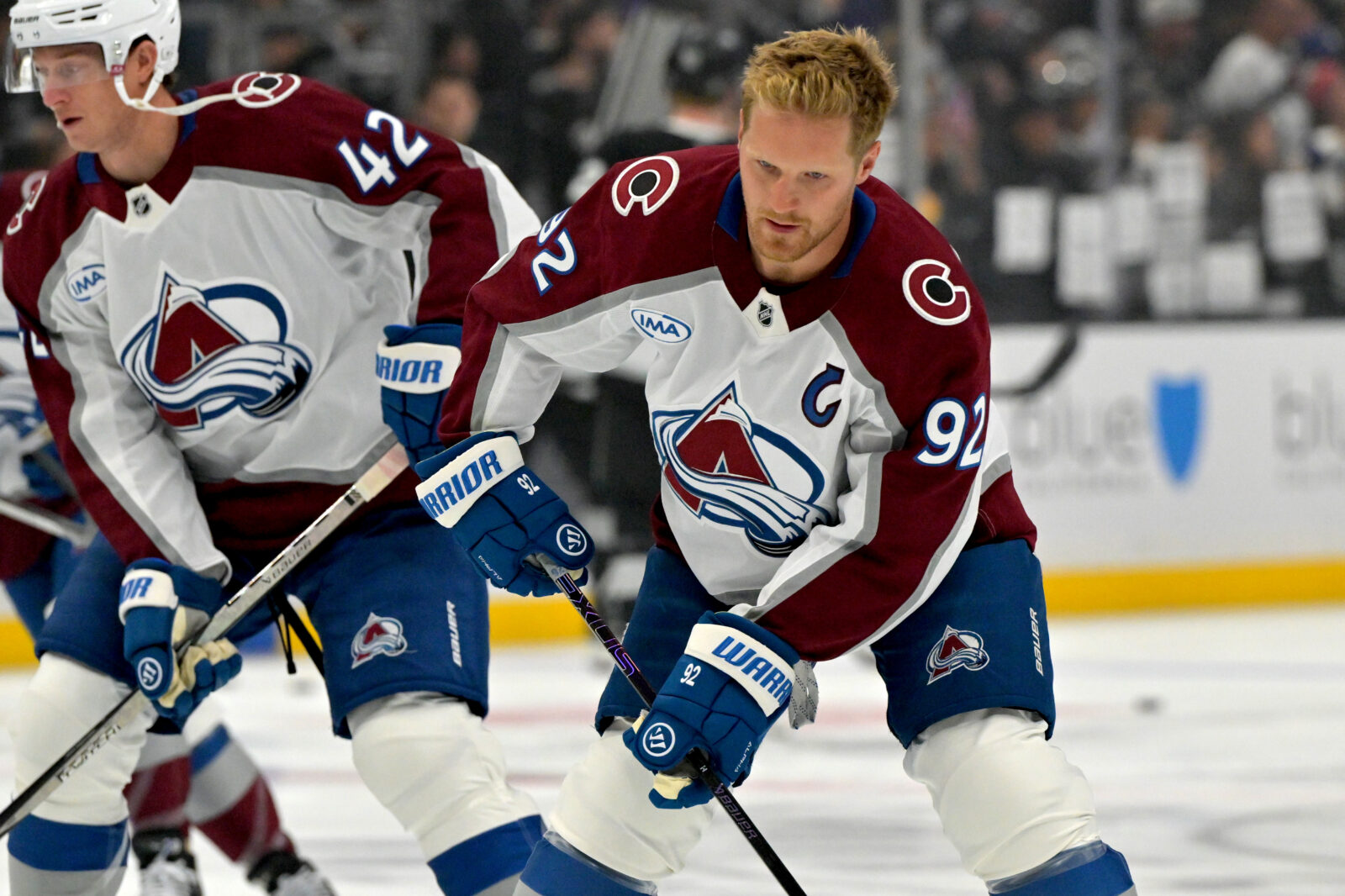
Oct 7, 2025; Los Angeles, California, USA; Colorado Avalanche left wing Gabriel Landeskog (92) warms up prior to the game against the Los Angeles Kings at Crypto.com Arena. Mandatory Credit: Jayne Kamin-Oncea-Imagn Images
As with any professional sports team or player, public opinion runs wild. There were plenty of talk-show hosts, writers and fans that believed the Avs, which had another Cup contending team, needed to move on. What can you say about the support and faith your organization had in you?
There were a lot of unknowns. I think the conversations that we were having throughout, they were there for me. They were supportive of whatever I needed. For them, it was an unknown too, right? I had to help them kind of understand what it looked like, what it was going to take. I didn’t even know the answers to some of those questions, so neither did they. Together, we kept having conversations about how things were going. There were some ups and downs and some peaks and valleys and lessons along the way. The main thing that we kept doing and having conversations about was [that] they understood pretty early on that I was pretty serious about this, and I was going to try my absolute hardest – not only for myself, but also for the organization. It was never one of those things like, “Gabe, we’ll see you whenever you’re back.” The door was always open. I was here for majority of the time — sometimes I was out of town — but the support was [always] great. The narrative from the outside? We don’t really put too much weight into it. I understand it. It’s totally fair game, totally reasonable. For me, we just kept it in-house. We kept talking, and we had somewhat of a plan of what we wanted it to look like in terms of rehab and when we wanted to skate and so forth – in terms of what my knee allowed. But at the end of the day, it was the healing process of my knee that [was at the] forefront. There’s not a lot you can do in terms of dictating some of those things. It’s just letting the natural healing process take time and trying to manage it the best you can. And that’s what we ended up doing.
You’re among the most elite athletes in the world. I’m sure there are ton of expectations you put on yourself when you’re at that level. At any point, did you have to alter those expectations? How hard was that?
I’ve had those conversations or thoughts with myself quite a few times – probably most noticeably now, as of late, as the season has started and we’re 11 games into it. I have high expectations of myself. I’ve done it for a long time. I’ve been hurt and in a physically altered state in terms of what I’m able to do at times here and there. So I’m trying to find the balance of expecting a lot out of myself, but also being graceful, being gentle in terms of the pressure I put on myself. It’s a balance and it’s an ongoing thing. I want to be the player I was pre-2022, but I also want to be better than that. And I haven’t been yet to date in this season. But it’s also a long season, and I have to give myself some time to work my way up to that and find my game and find the rhythm and all those things. So the balance of high expectations and grace is kind of where we’re at right now.
What’s the best piece of advice you can give to any athlete – anyone from the elite, professional level to the high school level – when it comes to battling through injury?
This is cliché as it comes, but adversity, honestly, there’s not much reward at the end unless there’s adversity involved. You think about anything we’ve gone through in life or anything we’ve achieved, it just doesn’t taste quite as good if there hasn’t been some sort of a dip before it, before adversity – an injury or whatever it might be. Being able to hold yourself accountable, to make a promise to yourself. Even for me, the promise the whole time was just that I’m seeing this through, I’m seeing this through! At the time, I didn’t really know what that was going to look like or what that meant, but I just couldn’t wake up in the morning and look at myself in the mirror and say, “Alright, you’re done. Go do something else.” I just didn’t feel like that was the way to go unless I’d really done everything humanly possible. Now, I’m a professional athlete, and this is what I get paid to do and this is my job, so I wasn’t going to quit by any means. As a high school athlete or collegiate athlete, I think understanding and embracing the challenge that comes with some of this adversity, I think that can be a superhuman strength. A lot of people would shy away from adversity or tough times – “Oh man, I don’t get to play as much. Oh man, I broke my foot…” – whatever it might be. But embracing that challenge and really letting that fuel yourself, I think that’s something people can learn a lot from.
You’ve had a chance to look back on playing in the postseason. Walk us through what that felt like? Does the adrenaline mask the pain? What were the risks going into that?
It was a little bit of a mixed bag, a little bit of everything. I remember feeling like I was very in control; there was just such a long lead up to it. I was trying my best not to let my attention get drained with everything that was going on around it. I had friends and family in town and people were reaching out, even if it was just (to say) good luck tonight or whatever it might be. I was trying to narrow my focus a little bit. But the one thing that kept coming back was the feeling of just looking in the rear-view mirror – looking at the journey, looking at some of the milestones, looking at some of the tough times, looking at some of the times where I pulled my wife aside and taking her out for dinner and just (having) a heart-to-heart conversation about how much I was struggling with X, Y, and Z or whatever. So, as I’m walking into Ball Arena that night, it was just like a movie playing back in my head. I’m so grateful for the journey and it wasn’t even so much about that game, that night or the moment – which I thought it was going to be. The whole time rehabbing, I’m thinking about the first game back. Then when I’m actually there, I’m thinking about everything that came in front of it. Funny how the mind works. It just goes to show you that it’s not necessarily about the destination – it’s cliché once again – but it’s the journey itself. Little micro-moments, the moments of quality time, [are] sometimes even more worth it.
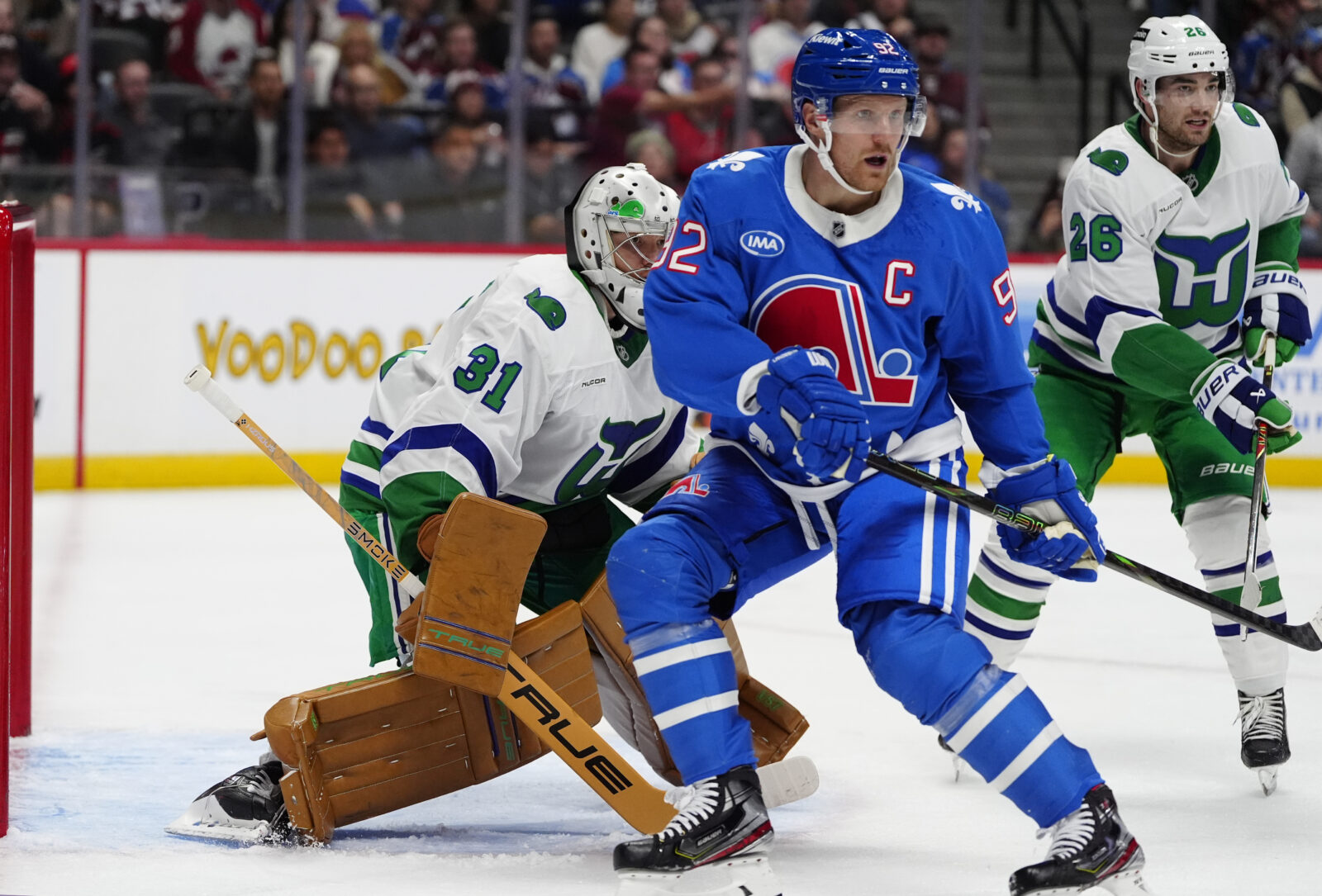
Oct 23, 2025; Denver, Colorado, USA; Colorado Avalanche left wing Gabriel Landeskog (92) shields Carolina Hurricanes goaltender Frederik Andersen (31) in the second period at Ball Arena. Mandatory Credit: Ron Chenoy-Imagn Images
What was this summer like, in terms of training? A balance of pushing and recovering? How was your overall health? Were there any doubts remaining?
Once the season ended, I took about 10 days or two weeks off and really just allowed myself to try to soak it in. I remember my dad was in town, the season was over, and we opened up a bottle of wine and we were just kind of enjoying it and trying to decompress a little bit. We did that for a little bit, but it was also hard. My wife was 30-some weeks pregnant and the kids needed me, so it was just kind of go, go, go at the same time. Regardless, I took a couple weeks off and then went back in the gym pretty quickly. I realized time off wasn’t necessarily making my knee feel better; it was almost the opposite. It almost needs the stimulation in the gym and skating. I got back on the ice and in the weight room fairly quickly, and then we had our third baby in June. That will increase your daily workload in terms of the home life. It’s all been awesome and so much fun adding another family member. That’s been great. In terms of my physical training, it was very much like you said in terms of balance and finding it – pushing the envelope, but also kind of making sure you recover and recoup, and then you push it a little bit the next week again. We made a lot of good progress there, a lot more skating than we had in years past. It was a fun offseason; a little bit more towards normal.
I read a great article in the Denver Post, where Corey Masisek interviewed you about being one of the last players off the practice ice this season – and how you really missed that while you were gone. What does Gabe Landeskog, who missed a ton of time with injury, understand and appreciate about the game of hockey, or even just your opportunity as a professional, that maybe the Gabe Landeskog who hadn’t experienced that understand and appreciate?
It’s just the appreciation for the little things, right? That’s really what it comes down to. It’s understanding that you’ve earned this other opportunity to do what you love to do, so just enjoy it, make the most of it, soak everything up. You’ve earned the right to have another opportunity, another crack at it. However much time you have left in this game, just enjoy it. That’s one of the things I learned when I was gone: the love for working on my craft, working on my game, working on my shot, stick handling, certain moves. I really enjoy that aspect of it, being able to feel yourself improving in certain areas. And there are not many things in my life that I really enjoy doing and enjoy feeling like I’m getting better at. I tried to learn a guitar years ago. I didn’t enjoy it because I don’t have necessarily have the natural talent for it. It was hurting my fingers, it was hurting my back, so many things. My point is: hockey, I love it. I really appreciate the sights and the sounds of it. It’s become almost like a sensory kind of experience for me. I try to soak that in. Through rehab and right after surgery, I’d lay in bed, my eyes closed, thinking about getting back on the ice and hearing the skates on the ice. Things like that, small details, made a big difference.
When you came back, it was at the peak of hockey excitement. There’s nothing like the Stanley Cup Playoffs; throw in the story of your comeback and it was insanity, to say the least. But here we are, five or so months removed. What do you love about showing up to the arena on a random Tuesday night in October for a game against… whoever?
A lot. I missed a lot of it. It’s kind of along the same theme in terms of appreciating those little things and appreciating the journey and appreciating the grind – not taking it for granted. There were days where you’d be dragging your feet on a road trip or a road game or whatever. You’re not feeling great, you’re sore. But I think just understanding the opportunity at hand – it goes for my teammates as well. I try to relay that message – “What a great day it is today!” For us having such a good team, it’s a great opportunity for us to lay the foundation to ultimately try to go win.
The last full season you played resulted in hoisting the Cup. What in that team, do you see in this team?
A lot of similarities, I’d say. There’s depth. The back end looks really strong. Goaltending looks really strong. It’s obviously two different teams, but I see a lot of good things in this team that I remember about that one. Depth is kind of the number one thing. You’re not winning without goaltending. You’re not winning it without a deep back end. Up front you’ve got, Nate, Marty, Lehky, Val, Nelson – you name it, it goes up and down the list. And then the experience, the mutual experience that we all had last spring, getting our hearts broken by Dallas. We all felt like we had a really strong chance last year; sometimes that adversity can really fuel you, propelling you moving forward. It’s kind of that motivating factor that we all have to together. I like where we’re at. We’ve had a good start — and we want to keep building.
